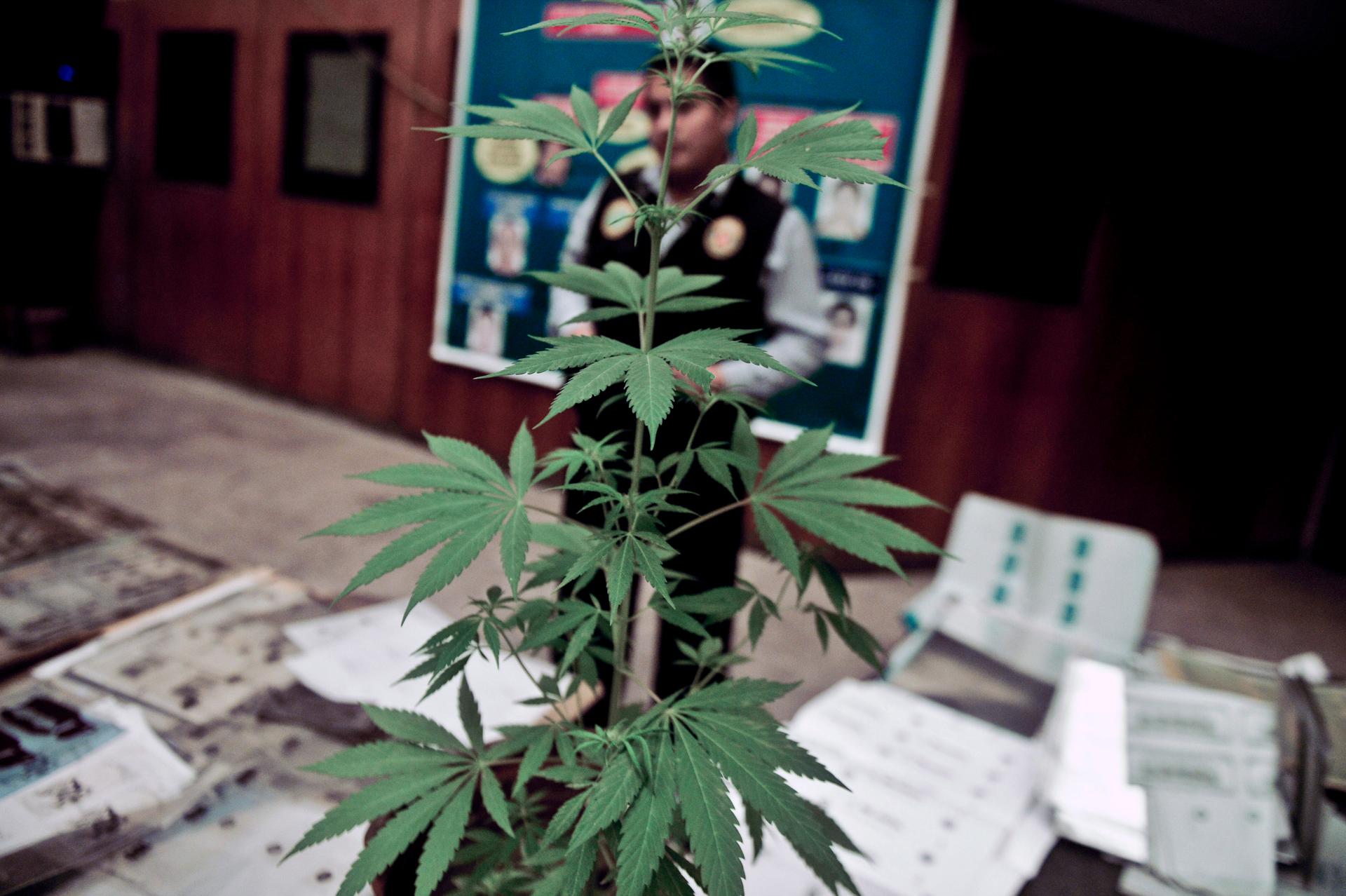Meet the Peruvian Rasta behind a landmark case for the right to grow weed
A marijuana plant stands next to counterfeit bills seized by Peru's Department of Criminology during a presentation to the press in Lima on April 17, 2013.
LIMA, Peru — “I live in a pacific way. I don’t harm anyone and they have tried to make me a criminal,” says Ernesto Paz as he exhales a thick cloud of smoke.
“They even cut off my dreadlocks by force in jail. When I asked them why, they told me, ‘Your human rights stay outside.’”
Paz, 29, is one of around 100 practicing Rastafarians in Peru. Smoking marijuana is a sacred ritual for him, his way of communing with Jah, as the religion of black liberation founded in Jamaica calls God.
He is taking a landmark case to Peru’s Supreme Court, one that could establish the right of Rastas and other cannabis users here to grow their own pot.
That would be a significant step for Peru, an avid fighter in the United States-backed global drug war. It would follow this month's stunning pot news in Mexico, whose Supreme Court ruled one group has the right to grow and use marijuana.
More from GlobalPost: Is Peru’s new anti-drug policy too tough even for Washington?
But it also touches on a huge problem. Mass incarceration for low-level, nonviolent drug offenses has increased across Latin America, and studies show it's doing zero to stop the drug trade.
Take Ernesto Paz. Back in May 2013, Paz, who doesn't use alcohol or any other drugs besides pot, was arrested after police found six cannabis plants in his garden in Pachacamac, a leafy suburb on Lima’s southern fringe. The cops acted on a neighbor’s tip-off.
After four months in Lurigancho jail without bail — and having his dreadlocks cut off, which violates Rastafarian beliefs — he was eventually given a suspended four-year jail sentence for growing with intent to sell, something he strongly denies.
More from GlobalPost: Peru prison: from pot smoke to pottery class
“It was all for my personal use. This is my way of praying, smoking marijuana,” says Paz, who also goes by his Rasta name of I Man I. “They don’t respect freedom of religion here.”
“If I was selling it, they would have found Ziploc bags, weighing scales and loads of money. They found 100 soles [roughly $30],” he says.
“If it had been a kilo of bud, then yeah, maybe I was dealing. But it was a kilo of sticks and roots. The plants hadn’t even budded yet.”
And that’s the rub. Paz was prosecuted under Article 296A of Peru’s criminal code. It prohibits cultivating weed. However, the entire Article 296, under which this prohibition falls, addresses the “trafficking of illegal drugs.”
It's the only section of the criminal code that explicitly refers to cultivating cannabis. Paz’s lawyer, Jorge Loyaga, insists that wording means Peruvian law does not actually prohibit growing the soft drug for personal use.
He has now filed an appeal against Paz’s conviction with the country’s Supreme Court, which is expected to hear the case in about a year.
“I am optimistic. Even though the lower court ruled against us, they were very clearly misinterpreting the law,” says Loaga, who works for a Lima-based nonprofit, the Center for Research on Drugs and Human Rights.
“I think the Supreme Court will rule in our favor and, finally, clarify what we already know the law really means here.”
Paz’s plight is typical in Peru. The law actually doesn’t punish possession of up to 8 grams (0.28 ounce) of cannabis for personal use. But it is routine for the cops to pick up users here.
And for those caught growing for commercial purposes, the penalties can be harsh. In one recent case, a man found guilty of growing 36 plants was given 27 years in jail.
Yet despite that, consumption here, and the industry meeting that demand, appears to be booming.
“Unfortunately, the police in Peru are very corrupt,” says Loaga. “It is too easy for them to pick on consumers, the bottom rung of the ladder, to intimidate them and misinform them about the law in order to squeeze money out of them. There are honorable exceptions, of course, but the majority of police here are corrupt.”
The National Police of Peru did not respond to GlobalPost’s requests for comment.
Now, as he seeks to put his life back together, Paz is driving a taxi while trying to launch a vegetarian catering business.
“I could have accepted the sentence but I can’t because I am not guilty,” he says. “I am not a drug trafficker. I am not going to live in fear. I am fighting for my rights.”
We want to hear your feedback so we can keep improving our website, theworld.org. Please fill out this quick survey and let us know your thoughts (your answers will be anonymous). Thanks for your time!
